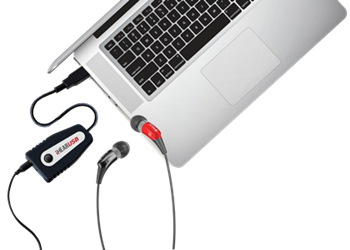FDA Clears First At-Home Hearing Test, Pushes For Hearing Aid Innovation

The FDA has cleared an at-home test for hearing loss designed and produced by California-based iHear Medical. The device meets standards outlined by the World Health Organization’s (WHO) standard practice of audiometry and is the first of its kind approved for over-the-counter sale. It is part of a national effort to improve access to basic hearing assessment and hearing aids.
In October, the President’s Council of Advisors on Science and Technology (PCAST) issued a letter in which scientists called for greater support of innovations in hearing technologies. According to the letter, nearly 30 million Americans suffer from age-related hearing loss (ARHL), but only 15 to 30 percent of this population uses hearing aids.
“Untreated hearing loss is statistically associated with higher risks of social isolation; depression; dementia; falls with injury; and inability to work, travel or be physically active,” said the letter’s authors, who added that a broader clinical study by the National Institutes of Health (NIH) was in the works to “supplement these correlational findings.”
PCAST characterized the hearing aid industry as “high cost” and “low innovation.” iHear Medical, a company aimed at developing affordable and accessible hearing technologies, reports that 40 percent of hearing-impaired Americans are low-income, and because of financial concerns, treatment is often delayed by six to nine years.
With the iHear Test, patients can test their hearing from home, with a device purchased over-the-counter for $49. The system includes a USB device that plugs into a home computer and is connected to factory-calibrated earphones. Downloaded software walks the patient through the entire hearing exam, step by step. Results are received and reviewed on a HIPAA-compliant server, and the system periodically rechecks earphones to ensure their proper calibration. Overall, the system is 96.4 percent compliant with WHO recommendations.
While other developers have introduced online hearing tests and mobile apps, iHear Medical maintains that these unregulated tests are not run through calibrated earphones or soundcards, and their results are consistently inaccurate. Furthermore, less than one-third of physicians regularly test their patients’ hearing, said Randy Pozos, president and health care technology analyst with Advanced Knowledge Resources, Inc, in a press release.
“This landmark FDA approval will allow us to reach out to millions who suspect hearing loss and conduct a basic hearing evaluation for themselves or their family members from the privacy and convenience of their home,” said Adnan Shennib, founder and CEO of iHear Medical.
Related, the FDA this week announced a meeting with stakeholders on April 16, 2016 to discuss ways by which hearing technology innovation can be encouraged and existing technology can be made more accessible.
“The FDA recognizes that hearing aids are an important and often underutilized medical device for those with hearing impairment. Additional insight from all stakeholders will help us to better understand how we can overcome the barriers to access and spur the development of devices that compensate for impaired hearing,” states the announcement.
Additionally, the FDA is reopening its comment period on a guidance that clarifies the agency’s regulation of different devices indicated for hearing loss. Industry stakeholders can submit their comments through May 19, 2016.
